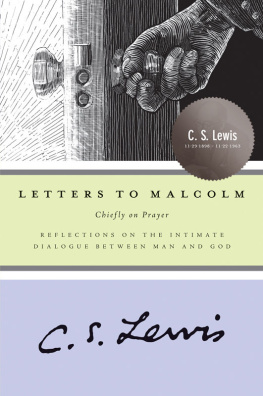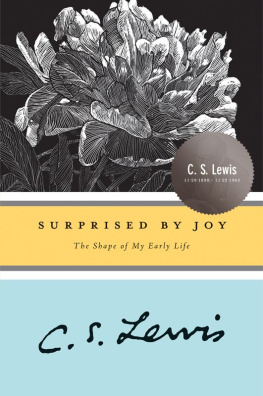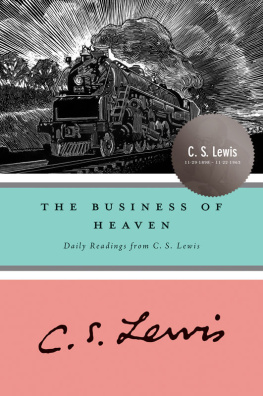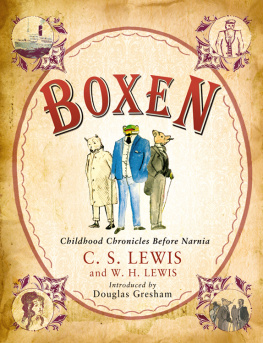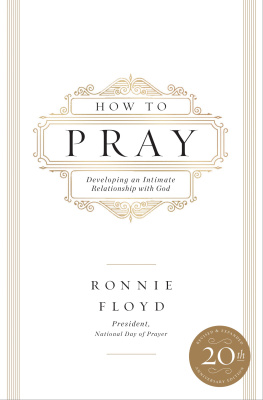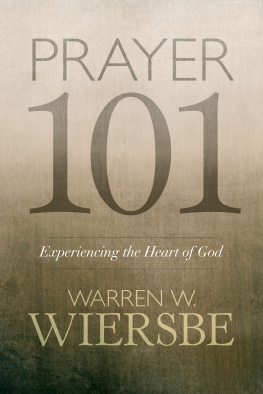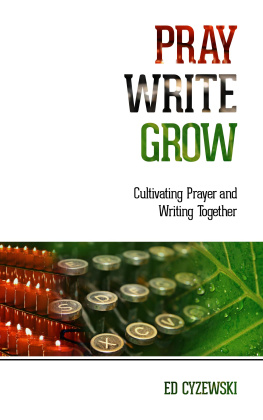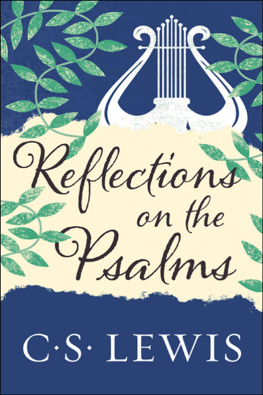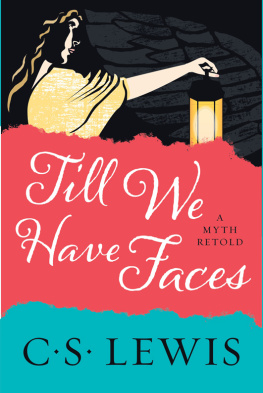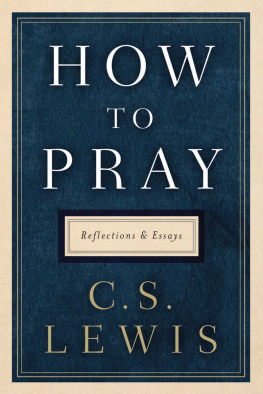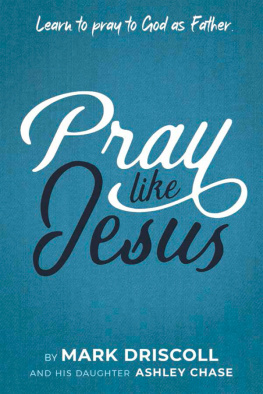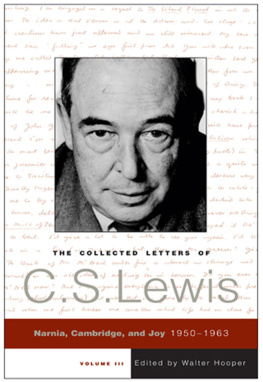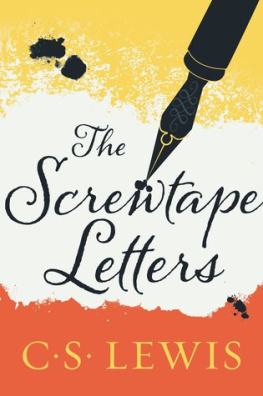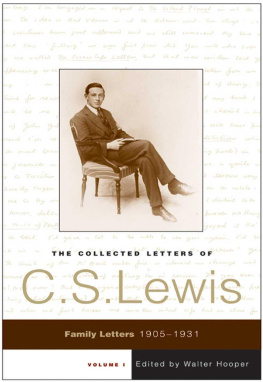
Table of Contents
First Mariner Books edition 2012
Copyright 1964, 1963 and renewed 1992, 1991 by C. S. Lewis PTE Limited
All rights reserved. No part of this publication may be reproduced or transmitted in any form or by any means, electronic or mechanical, including photocopy, recording, or any information storage and retrieval system, without permission in writing from the publisher.
For information about permission to reproduce selections from this book, write to Permissions, Houghton Mifflin Harcourt Publishing Company, 215 Park Avenue South, New York, New York 10003.
Library of Congress Cataloging-in-Publication Data is available.
ISBN 978-0-15-602766-3 (pb.)
e ISBN 978-0-547-54139-6
v4.0315
I
I AM all in favour of your idea that we should go back to our old plan of having a more or less set subjectan agendumfor our letters. When we were last separated the correspondence languished for lack of it. How much better we did in our undergraduate days with our interminable letters on the Republic, and classical metres, and what was then the new psychology! Nothing makes an absent friend so present as a disagreement.
Prayer, which you suggest, is a subject that is a good deal in my mind. I mean, private prayer. If you were thinking of corporate prayer, I wont play. There is no subject in the world (always excepting sport) on which I have less to say than liturgiology. And the almost nothing which I have to say may as well be disposed of in this letter.
I think our business as laymen is to take what we are given and make the best of it. And I think we should find this a great deal easier if what we were given was always and everywhere the same.
To judge from their practice, very few Anglican clergymen take this view. It looks as if they believed people can be lured to go to church by incessant brightenings, lightenings, lengthenings, abridgements, simplifications, and complications of the service. And it is probably true that a new, keen vicar will usually be able to form within his parish a minority who are in favour of his innovations. The majority, I believe, never are. Those who remainmany give up churchgoing altogethermerely endure.
Is this simply because the majority are hide-bound? I think not. They have a good reason for their conservatism. Novelty, simply as such, can have only an entertainment value. And they dont go to church to be entertained. They go to use the service, or, if you prefer, to enact it. Every service is a structure of acts and words through which we receive a sacrament, or repent, or supplicate, or adore. And it enables us to do these things bestif you like, it works bestwhen, through long familiarity, we dont have to think about it. As long as you notice, and have to count, the steps, you are not yet dancing but only learning to dance. A good shoe is a shoe you dont notice. Good reading becomes possible when you need not consciously think about eyes, or light, or print, or spelling. The perfect church service would be one we were almost unaware of; our attention would have been on God.
But every novelty prevents this. It fixes our attention on the service itself; and thinking about worship is a different thing from worshipping. The important question about the Grail was for what does it serve? Tis mad idolatry that makes the service greater than the god.
A still worse thing may happen. Novelty may fix our attention not even on the service but on the celebrant. You know what I mean. Try as one may to exclude it, the question What on earth is he up to now? will intrude. It lays ones devotion waste. There is really some excuse for the man who said, I wish theyd remember that the charge to Peter was Feed my sheep; not Try experiments on my rats, or even, Teach my performing dogs new tricks.
Thus my whole liturgiological position really boils down to an entreaty for permanence and uniformity. I can make do with almost any kind of service whatever, if only it will stay put. But if each form is snatched away just when I am beginning to feel at home in it, then I can never make any progress in the art of worship. You give me no chance to acquire the trained habithabito dellarte.
It may well be that some variations which seem to me merely matters of taste really involve grave doctrinal differences. But surely not all? For if grave doctrinal differences are really as numerous as variations in practice, then we shall have to conclude that no such thing as the Church of England exists. And anyway, the Liturgical Fidget is not a purely Anglican phenomenon; I have heard Roman Catholics complain of it too.
And that brings me back to my starting point. The business of us laymen is simply to endure and make the best of it. Any tendency to a passionate preference for one type of service must be regarded simply as a temptation. Partisan Churchmanships are my bte noire. And if we avoid them, may we not possibly perform a very useful function? The shepherds go off, everyone to his own way, and vanish over diverse points of the horizon. If the sheep huddle patiently together and go on bleating, might they finally recall the shepherds? (Havent English victories sometimes been won by the rank and file in spite of the generals?)
As to the words of the serviceliturgy in the narrower sensethe question is rather different. If you have a vernacular liturgy you must have a changing liturgy: otherwise it will finally be vernacular only in name. The ideal of timeless English is sheer nonsense. No living language can be timeless. You might as well ask for a motionless river.
I think it would have been best, if it were possible, that necessary change should have occurred gradually and (to most people) imperceptibly; here a little and there a little, one obsolete word replaced in a centurylike the gradual change of spelling in successive editions of Shakespeare. As things are, we must reconcile ourselves, if we can also reconcile government, to a new Book.
If we wereI thank my stars Im notin a position to give its authors advice, would you have any advice to give them? Mine could hardly go beyond unhelpful cautions. Take care. It is so easy to break eggs without making omelettes.
Already our liturgy is one of the very few remaining elements of unity in our hideously divided Church. The good to be done by revision needs to be very great and very certain before we throw that away. Can you imagine any new Book which will not be a source of new schism?
Most of those who press for revision seem to wish that it should serve two purposes: that of modernising the language in the interests of intelligibility, and that of doctrinal improvement. Ought the two operationseach painful and each dangerousto be carried out at the same time? Will the patient survive?
What are the agreed doctrines which are to be embodied in the new Book and how long will agreement on them continue? I ask with trepidation because I read a man the other day who seemed to wish that everything in the old book which was inconsistent with orthodox Freudianism should be deleted.
For whom are we to cater in revising the language? A country parson I know asked his sexton what he understood by indifferently in the phrase truly and indifferently administer justice. The man replied, It means making no difference between one chap and another. And what would it mean if it said impartially? asked the parson. Dont know. Never heard of it, said the sexton. Here, you see, we have a change intended to make things easier. But it does so neither for the educated, who understand indifferently
Next page
